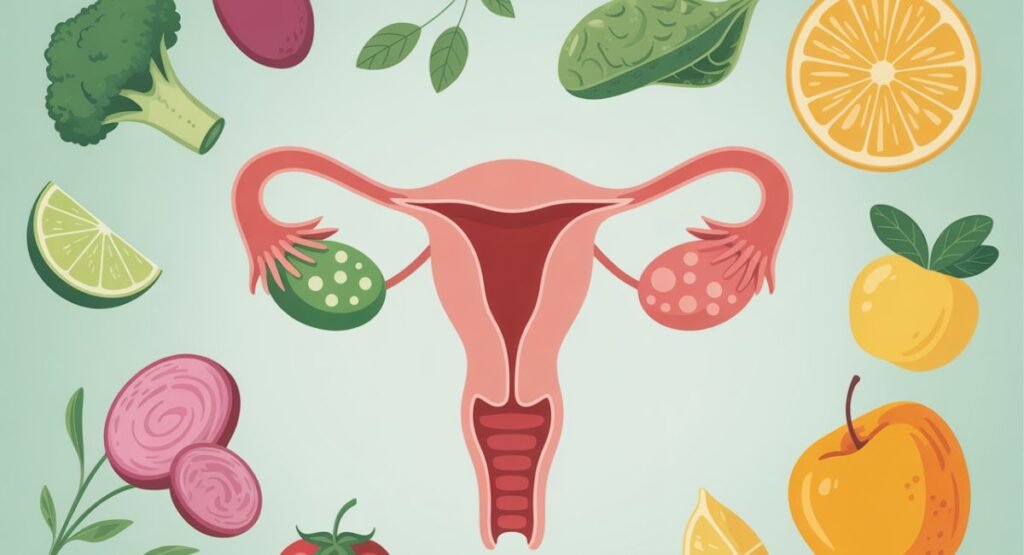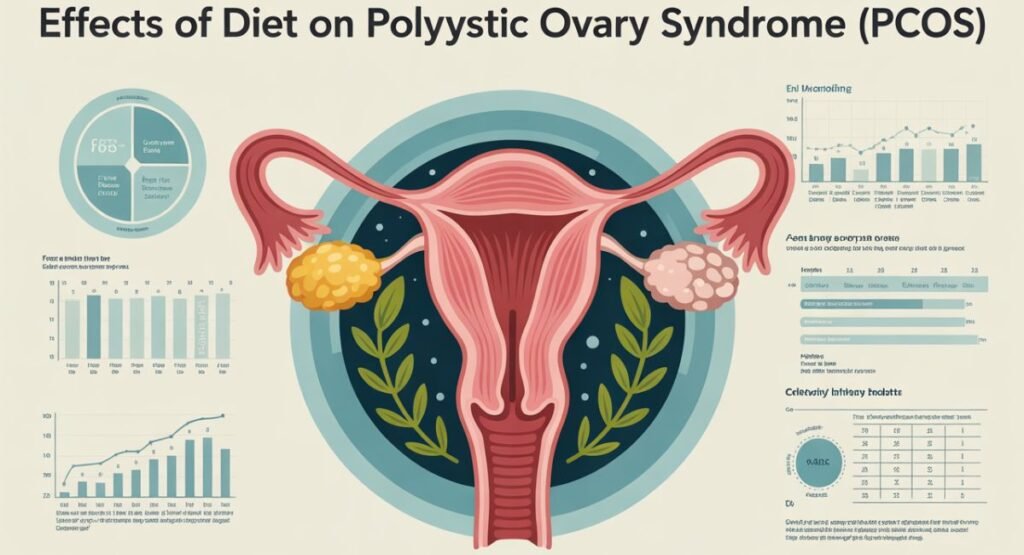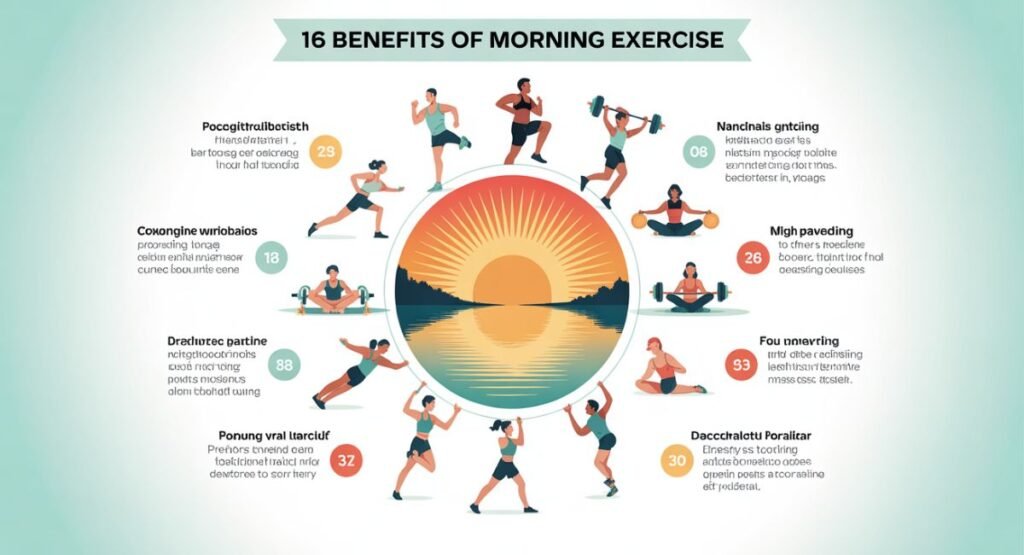Introduction
Living with polycystic ovary syndrome can feel overwhelming, especially when symptoms like weight gain, irregular cycles, and fatigue show up without warning. Research proves that what you eat has a powerful influence on how your body responds to this condition. A well-structured diet for PCOS does more than control cravings; it helps regulate hormones and manage insulin sensitivity. By focusing on a balanced PCOS nutrition plan, women can reduce inflammation, support healthy weight, and improve energy levels. Choosing the best diet for PCOS may not be simple, yet the right foods create real change. Consistency makes the PCOS diet an empowering long-term lifestyle choice.

Understanding PCOS and Its Health Impact
Polycystic ovary syndrome is one of the most common hormonal disorders in women of reproductive age. It affects the ovaries, leading to irregular periods, fertility problems, acne, and excess hair growth. Many women also experience mood changes and fatigue, which make daily life challenging.
The condition is linked to insulin resistance PCOS, meaning the body struggles to use insulin properly. This often results in higher blood sugar and weight gain. Choosing the right diet for PCOS becomes crucial because food directly influences hormones, metabolism, and long-term health. A PCOS nutrition plan helps women balance their hormones and improve overall well-being.
How Does Diet Affect PCOS?
A PCOS diet impacts the body through insulin and hormone regulation. Diets high in refined carbs spike blood sugar, which increases insulin levels. This worsens symptoms and raises the risk of diabetes. Managing food intake can reduce the PCOS and obesity link, improve ovulation, and support fertility.
Inflammation is another key factor. Studies show inflammation and PCOS are closely related. A nutrient-rich diet reduces inflammation, balances hormones, and supports energy levels. This is why nutrition is often considered as important as medicines for long-term control of polycystic ovary syndrome.
Best Foods to Include in a PCOS Diet
Eating whole, nutrient-rich foods helps manage symptoms. Whole grains and PCOS have a strong connection because they stabilize blood sugar and improve energy. Lean protein for PCOS, like chicken, fish, and legumes, keeps you full without raising insulin. Healthy fats, such as avocados and nuts, help regulate hormones.
A PCOS nutrition plan should include fruits, vegetables, and high-fiber meals. Non-starchy vegetables with PCOS, such as broccoli, spinach, and zucchini, are excellent for blood sugar control. Including omega-3 foods PCOS-like salmon and flaxseeds helps fight inflammation and improves heart health.
Low Glycemic Index (GI) Foods
A low glycemic index diet helps stabilize glucose and reduce insulin spikes. Foods like oats, quinoa, and lentils digest slowly and keep hunger in check. Research shows these healthy carbs for PCOS help regulate cycles and improve energy throughout the day.
Anti-Inflammatory Diet Choices
An anti-inflammatory diet PCOS includes berries, leafy greens, turmeric, and olive oil. These reduce inflammation and support hormone balance. Adding omega-3 foods for PCOS, such as walnuts or chia seeds, further lowers risks of heart disease and diabetes.
Hydration and Smart Beverages
Hydration is often overlooked, but it plays a huge role. Following PCOS hydration tips means drinking plenty of water and choosing herbal teas instead of sugary drinks. Staying hydrated improves metabolism, reduces cravings, and supports hormone balance.
Foods to Limit or Avoid with PCOS
Some foods make PCOS symptoms worse. Refined carbs and PCOS are a dangerous mix because white bread, pastries, and sugary drinks spike insulin. Fried foods, processed meat, and soda also worsen hormonal imbalance.
Limiting red meat and avoiding artificial sweeteners helps reduce inflammation. Many fad diets restrict whole food groups, but fad diets and PCOS often create more harm than good. Instead, focus on balance and long-term health.
Which Diet Works Best for PCOS?
Different diets show benefits for women with PCOS. A low glycemic index diet stabilizes blood sugar and helps with weight loss. An anti-inflammatory diet for PCOS reduces swelling, acne, and fatigue. The Mediterranean diet for PCOS combines both and is often considered the best diet for PCOS.
The DASH diet also shows promise, especially for blood pressure and heart health. However, the most effective PCOS prevention diet is the one you can follow consistently, with variety and balance.
PCOS, Weight Gain, and Metabolism
Many women face PCOS weight loss challenges because of slower metabolism and high insulin levels. This makes fat storage easier and weight loss harder. Choosing balanced nutrition for PCOS can reduce cravings and improve metabolism.
The PCOS and obesity link shows why diet and exercise are essential. Consistent changes in eating patterns improve hormone regulation, helping in long-term PCOS weight management.

Lifestyle Changes Beyond Diet
Food is vital, but other PCOS lifestyle changes also matter. Exercise improves insulin sensitivity and reduces stress hormones. Activities like yoga, walking, and strength training are all helpful.
Sleep is another major factor. Poor sleep worsens cravings and hormone imbalance. Stress management through meditation or deep breathing supports both physical and mental health.

Medical Treatments That Work with Diet
Sometimes food alone is not enough. Doctors may prescribe medicines like metformin for insulin resistance PCOS or birth control pills to regulate cycles. Fertility treatments such as IVF can also help.
In severe cases, surgery may be recommended, especially when cysts cause pain or fertility problems. Still, combining medicine with a PCOS nutrition plan provides the best outcomes.
Practical PCOS Meal Planning Tips
Meal planning makes healthy eating easier. Following a PCOS meal planning system means building balanced plates with lean protein, healthy carbs, and plenty of vegetables. Adding PCOS-friendly snacks like nuts, yogurt, or hummus keeps hunger stable.
Weekly planning reduces stress and prevents overeating. Remember, balanced nutrition for PCOS is about consistency, not perfection. Preparing meals in advance helps you avoid unhealthy choices during busy days.

Sample Table: Foods for PCOS
| Category | Foods for PCOS | Foods to Avoid |
| Carbohydrates | Oats, quinoa, brown rice | White bread, pastries |
| Protein | Chicken, fish, beans, tofu | Processed meats, fried chicken |
| Healthy fats | Avocados, olive oil, nuts | Trans fats, margarine |
| Vegetables | Spinach, broccoli, zucchini | Fried potatoes |
| Beverages | Water, green tea, herbal teas | Soda, energy drinks |
Frequently Asked Questions (FAQs)
Can PCOS be cured with diet alone? The answer is no, but food choices can greatly improve symptoms and reduce long-term risks.
Is intermittent fasting for PCOS safe? For some women it helps, but others may experience stress or cycle changes. Always consult a doctor first.
Can PCOS patients eat dairy or gluten? Moderation works best. Some women feel better when reducing dairy or gluten, but it is not required for everyone.
Conclusion:
Managing polycystic ovary syndrome is a lifelong journey, but the right food choices make it easier. A diet for PCOS that includes whole foods, lean proteins, and anti-inflammatory choices improves hormone balance and boosts energy.
Pairing nutrition with exercise, stress control, and sleep leads to long-term success. With a consistent PCOS nutrition plan, women can manage symptoms, improve fertility, and enjoy better health. A PCOS prevention diet is not about restriction but about nourishing your body and building a healthier future.



